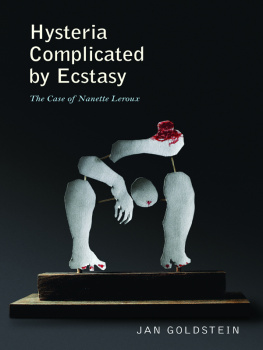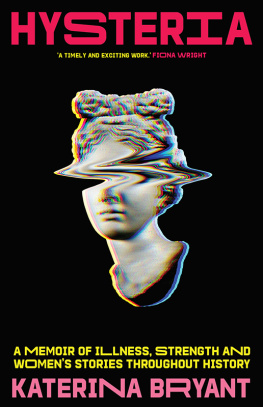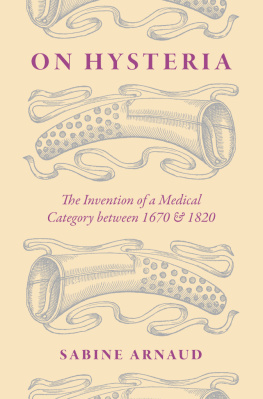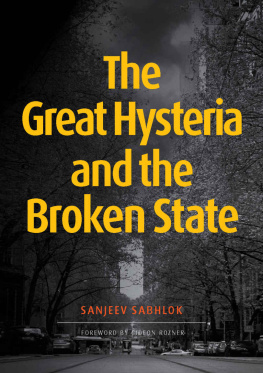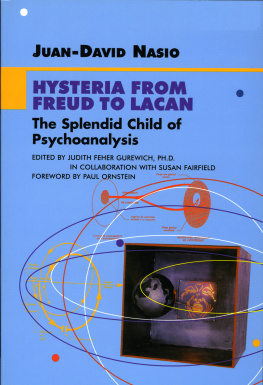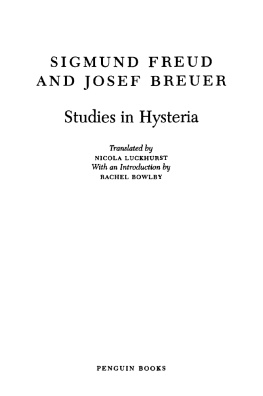
Hysteria Complicated by Ecstasy
Hysteria Complicated by Ecstasy
The Case of Nanette Leroux
JAN GOLDSTEIN
PRINCETON UNIVERSITY PRESS
PRINCETON AND OXFORD
For Bill, meilleur ami
Copyright 2010 by Princeton University Press
Published by Princeton University Press, 41 William Street, Princeton, New Jersey 08540
In the United Kingdom: Princeton University Press, 6 Oxford Street, Woodstock, Oxfordshire OX20 1TW
All Rights Reserved
Library of Congress Cataloging-in-Publication Data
Goldstein, Jan
Hysteria complicated by ecstasy : the case of Nanette Leroux / Jan Goldstein.
p. cm.
Includes bibliographical references and index.
ISBN 978-0-691-01186-8 (cloth : alk. paper) 1. HysteriaCase studies. 2. Leroux, NanetteMental health. 3. PsychiatryFranceHistory19th century. I. Bertrand, Alexandre-Jacques-Franois, 17951831. II. Despine, Charles-Humbert-Antoine, 17771852. III. Title.
RC532.G65 2010
616.8524dc22 2009001385
British Library Cataloging-in-Publication Data is available
This book has been composed in Bell Mt Std
Printed on acid-free paper.
press.princeton.edu
Printed in the United States of America
10 9 8 7 6 5 4 3 2 1
Contents
Illustrations
Figures
Maps
Preface
B egun as a jeu desprit, this book took longer to complete than I ever imagined. I probably should not have been surprised. From the outset, I envisioned the book as twofold: an essay in microhistory and, ancillary to it, a more traditional effort of text editing and translation. Despite my initially playful attitude, I had chosen a very labor-intensive format.
As a microhistory touching on early nineteenth-century French and Savoyard medicine, law, politics, gender relations, spas, animal magnetism, and time-telling devices (to offer only a partial list), the book has required indepth investigations of a far-flung sortsome of them archival in nature, some arcane, each fascinating in its own way. Because that microhistory was based on a never-finished and (it turned out) somewhat jumbled manuscript that I had discovered at the Institut de France, it required me to engage in intricate textual detective workwork that has given me increased respect for the founders of the modern historical profession, who pioneered these techniques. Also thorny were the theoretical aspects of the microhistory, especially those dealing with the puzzling treatment of sexuality by the authors of the original manuscript.
Now that the book is completed, I am finally able to record in print my gratitude for all the help, institutional and personal, that I received along the way.
As befits a jeu desprit, serendipity played a large role in launching this project. I might never have pursued the project at all if Terence Murphy had not encouraged my impulse to have the Leroux manuscript microfilmed shortly after I encountered it at the Institut de France. I might have left that microfilm to gather dust had Muriel Dimen and Adrienne Harris not invited me to take part in an interdisciplinary conference at New York University in honor of the centenary of the publication of Breuer and Freuds Studies on Hysteria. Quite by chance, Brigitta van Rheinberg, then history editor and now editor-in-chief at Princeton University Press, visited Chicago just after I returned from that conference, and her immediate enthusiasm for the nascent Leroux project resulted in a book contract.
Most of my early work on the Leroux case was done in time stolen from another book project. But only an uninterrupted year of writing enabled me to produce a complete draft of the book. That wonderful year was provided by the National Humanities Center, where I held the Archie K. Davis Fellowship in 200607. I particularly thank Kent Mullikin, deputy director, for the invitation to the center and for his gracious good company during the year, and the center librarians for making obscure interlibrary-loan titles appear in my study as if by magic. The generous leave policy of the Social Sciences Division of the University of Chicago enabled me to benefit from the perfect environment for scholarly endeavor at the NHC.
Earlier versions of portions of the book were presented at many venues over the years, supplying me with important critical feedback as well as sustaining encouragement. I thank the following institutions and the colleagues and students who attended those presentations: New York University Postdoctoral Program in Psychotherapy and Psychoanalysis; University of Toronto Seminar in the History of Medicine; Berkshire Conference of Women Historians; International conference Michel Foucault et la mdecine, IMEC, Caen, France; Seminar of the Program in History and Philosophy of Science, Northwestern University; International conference The Health of Nations, Katholieke Universiteit Leuven, Belgium; Universidad de La Laguna, Tenerife Spain; International conference Foucault: Nouveaux dploiements, Universit de Paris-12 and University of Chicago Paris Center; Centre for the History of Medicine, University of Warwick, UK; Social Theory Workshop, University of Chicago; National Humanities Center; Triangle Area French Cultural Studies Seminar; Eugene Lunn Memorial Lecture, University of California, Davis; Socit internationale de lhistoire de la psychiatrie et de la psychanalyse, Paris; Centre dhistoire du XIXe sicle, Universit de Paris-1.
Many friends, colleagues, and students offered helpful suggestions about the project along the way. I would particularly like to thank Keith Baker, Robin Bates, Maxine Berg, Michael Broers, Lorraine Daston, Arnold Davidson, Daniel Defert, Thomas Dodman, Nicole Edelman, Priscilla Ferguson, Rachel Fuchs, Nancy Green, William Hagen, Sarah Hodges, Sara Hume, Dominique Kalifa, Alice Kessler-Harris, Mimi Kim, Patricia Mainardi, Linda Orr, Jacques Postel, Connie Rosati, Elisabeth Roudinesco, Andrew Sartori, Erika Vause, Fernando Vidal, Elizabeth Williams, and Nancy Youssef. The work of final revision coincided with the year that I served as director of the University of Chicago Center in Paris. There I was fortunate to have the expert computer assistance of Sbastien Greppo, the administrative director of the center, who dispensed it with his customary generosity and good humor.
The staff at the library of the Institut de France, which houses the Leroux manuscript, were always obliging during my many intermittent visits there over the years. I also wish to thank the Commission des Bibliothques et . He also put me in contact with Estelle Fallet, curator of the Muse de lHorlogerie et de lEmaillerie in Geneva, who further enlightened me about this preferred timepiece of Nanette Leroux.
At Princeton University Press, Brigitta van Rheinberg handled me, her unspeedy author, with just the right blend of patience and prodding. Clara Platter was likewise a pleasure to work with, Anita OBrien skillfully dispatched the copyediting, and Ellen Foos was a model production editor. I am grateful to the two anonymous readers for the Press for their thorough and perceptive comments. Finally Tom Laqueur, who read the manuscript for the Press without cover of anonymity, served as a loyal friend, provoking me to rethink and to strengthen key aspects of my argument.
My greatest thanks go to my husband, Bill Sewell, who by now knows Nanette Leroux almost as well as I do. He read two versions of this book and spent countless hours talking with me about it, helping me to clarify my ideas and suggesting his own, astute perspectives. This book is lovingly dedicated to him.
Part One
Next page
